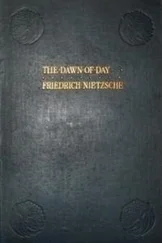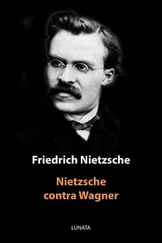First principle : melody is immoral. Proof : "Palestrina". Application : "Parsifal." The absence of melody is in itself sanctifying….
And this is the definition of passion. Passion—or the acrobatic feats of ugliness on the tight–rope of enharmonic—My friends, let us dare to be ugly! Wagner dared it! Let us heave the mud of the most repulsive harmonies undauntedly before us. We must not even spare our hands! Only thus, shall we become natural ….
And now a last word of advice. Perhaps it covers everything— Let us be idealists! —If not the cleverest, it is at least the wisest thing we can do. In order to elevate men we ourselves must be exalted. Let us wander in the clouds, let us harangue eternity, let us be careful to group great symbols all around us! Sursum! Bumbum! —there is no better advice. The "heaving breast" shall be our argument, "beautiful feelings" our advocates. Virtue still carries its point against counterpoint. "How could he who improves us, help being better than we?" man has ever thought thus. Let us therefore improve mankind!—in this way we shall become good (in this way we shall even become "classics"—Schiller became a "classic"). The straining after the base excitement of the senses, after so–called beauty, shattered the nerves of the Italians: let us remain German! Even Mozart's relation to music—Wagner spoke this word of comfort to us—was at bottom frivolous….
Never let us acknowledge that music "may be a recreation," that it may "enliven," that it may "give pleasure." Never let us give pleasure! —we shall be lost if people once again think of music hedonistically…. That belongs to the bad eighteenth century…. On the other hand, nothing would be more advisable (between ourselves) than a dose of— cant, sit venia verbo . This imparts dignity.—And let us take care to select the precise moment when it would be fitting to have black looks, to sigh openly, to sigh devoutly, to flaunt grand Christian sympathy before their eyes. "Man is corrupt who will save him? what will save him? " Do not let us reply. We must be on our guard. We must control our ambition, which would bid us found new religions. But no one must doubt that it is we who save him, that in our music alone salvation is to be found…. (See Wagner's essay, "Religion and Art.")
7.
Enough! Enough! I fear that, beneath all my merry jests, you are beginning to recognise the sinister truth only too clearly—the picture of the decline of art, of the decline of the artist. The latter, which is a decline of character, might perhaps be defined provisionally in the following manner: the musician is now becoming an actor, his art is developing ever more and more into a talent for telling lies . In a certain chapter of my principal work which bears the title "Concerning the Physiology of Art," [9] See "The Will to Power," vol. ii., authorised English edition.— Tr.
I shall have an opportunity of showing more thoroughly how this transformation of art as a whole into histrionics is just as much a sign of physiological degeneration (or more precisely a form of hysteria), as any other individual corruption, and infirmity peculiar to the art which Wagner inaugurated: for instance the restlessness of its optics, which makes it necessary to change one's attitude to it every second. They understand nothing of Wagner who see in him but a sport of nature, an arbitrary mood, a chapter of accidents. He was not the "defective," "ill–fated," "contradictory" genius that people have declared him to be. Wagner was something complete , he was a typical décadent , in whom every sign of "free will" was lacking, in whom every feature was necessary. If there is anything at all of interest in Wagner, it is the consistency with which a critical physiological condition may convert itself, step by step, conclusion after conclusion, into a method, a form of procedure, a reform of all principles, a crisis in taste.
At this point I shall only stop to consider the question of style . How is decadence in literature characterised? By the fact that in it life no longer animates the whole. Words become predominant and leap right out of the sentence to which they belong, the sentences themselves trespass beyond their bounds, and obscure the sense of the whole page, and the page in its turn gains in vigour at the cost of the whole,—the whole is no longer a whole. But this is the formula for every decadent style: there is always anarchy among the atoms, disaggregation of the will,—in moral terms: "freedom of the individual,"—extended into a political theory " equal rights for all." Life, equal vitality, all the vibration and exuberance of life, driven back into the smallest structure, and the remainder left almost lifeless. Everywhere paralysis, distress, and numbness, or hostility and chaos both striking one with ever increasing force the higher the forms of organisation are into which one ascends. The whole no longer lives at all: it is composed, reckoned up, artificial, a fictitious thing.
In Wagner's case the first thing we notice is an hallucination, not of tones, but of attitudes. Only after he has the latter does he begin to seek the semiotics of tone for them. If we wish to admire him, we should observe him at work here: how he separates and distinguishes, how he arrives at small unities, and how he galvanises them, accentuates them, and brings them into pre–eminence. But in this way he exhausts his strength the rest is worthless. How paltry, awkward, and amateurish is his manner of "developing," his attempt at combining incompatible parts. His manner in this respect reminds one of two people who even in other ways are not unlike him in style—the brothers Goncourt; one almost feels compassion for so much impotence. That Wagner disguised his inability to create organic forms, under the cloak of a principle, that he should have constructed a "dramatic style" out of what we should call the total inability to create any style whatsoever, is quite in keeping with that daring habit, which stuck to him throughout his life, of setting up a principle wherever capacity failed him. (In this respect he was very different from old Kant, who rejoiced in another form of daring, i.e. : whenever a principle failed him, he endowed man with a "capacity" which took its place…) Once more let it be said that Wagner is really only worthy of admiration and love by virtue of his inventiveness in small things, in his elaboration of details,—here one is quite justified in proclaiming him a master of the first rank, as our greatest musical miniaturist who compresses an infinity of meaning and sweetness into the smallest space. His wealth of colour, of chiaroscuro, of the mystery of a dying light, so pampers our senses that afterwards almost every other musician strikes us as being too robust. If people would believe me, they would not form the highest idea of Wagner from that which pleases them in him to–day. All that was only devised for convincing the masses, and people like ourselves recoil from it just as one would recoil from too garish a fresco. What concern have we with the irritating brutality of the overture to the "Tannhäuser"? Or with the Walkyrie Circus? Whatever has become popular in Wagner's art, including that which has become so outside the theatre, is in bad taste and spoils taste. The "Tannhäuser" March seems to me to savour of the Philistine; the overture to the "Flying Dutchman" is much ado about nothing; the prelude to "Lohengrin" was the first, only too insidious, only too successful example of how one can hypnotise with music (—I dislike all music which aspires to nothing higher than to convince the nerves). But apart from the Wagner who paints frescoes and practises magnetism, there is yet another Wagner who hoards small treasures: our greatest melancholic in music, full of side glances, loving speeches, and words of comfort, in which no one ever forestalled him,—the tone–master of melancholy and drowsy happiness…. A lexicon of Wagner's most intimate phrases—a host of short fragments of from five to fifteen bars each, of music which nobody knows …. Wagner had the virtue of décadents ,—pity….
Читать дальше











